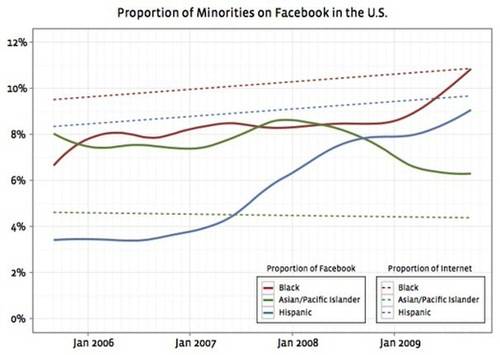Facebook is an accepted means of communication. It is a never-ending virtual social gathering filled with adopted puppies, cute LOL kitties, baby announcements, viral articles and videos, events, groups, organizations and fan pages. But why do people really use it?

A new study entitled “Why do people use Facebook?” from Boston University’s Ashwini Nadkarni and Stefan G. Hofmann proposes that the social network meets two primary human needs: (1) the need to belong and (2) the need for self-presentation. The study also acknowledges demographic and cultural factors as they relate to the belonging need, and the variation of personality types on Facebook usage.
The study defines social networking sites (SNSs) as “Internet-based services that give individuals three major capabilities: The ability to construct a public or semi-private profile, identify a list of other users with whom a connection is shared, and view and track connections made by individuals and others.
Who Is Using Facebook? A Breakdown by Demographics
Before 2009, MySpace led the social network race. By April 2009, it was dead. A 2008 study by E. Hargittai found that Hispanic students made up 25% of the MySpace population as compared to only 14% of Facebook users. The demographics of Facebook are quite different. Women are more likely to use Facebook than men, and Hispanic students were less likely to use it than Caucasians.
A study from 2009 by Grasmuck, Martin & Zhao found that African Americans, Latinos and Indian students displayed “greater intensity of cultural selves (marked by specific consumer and popular culture preferences) than the White students and Vietnamese ancestry students.”
This is in line with findings from the Facebook Data team, which shows the steady increase of black and Hispanic users in early 2009, and a decline of the number of Asian users. This data looked at surnames on Facebook with data collected by the U.S. Census Bureau to see percentages of racial minorities on Facebook.

What Types of People Use Facebook? A Cyberpsychology Approach
Previous studies have looked at the similarities between offline personality portrayal and online personality, proving strong connections between real personality and Facebook-related behavior. Extroverts report the most friends and highest engagement levels. People categorized as conscientious types – disciplined, organized and achievement-oriented – report the least Facebook use.
Facebook engagement results in a trail of virtual residue, including photos, videos, links, status updates and other traces of a virtual presence. A 2009 study by Ross et al. found that personality types that ranked high on neuroticism claimed the Facebook Wall as their favorite component. People who were low on neuroticism, however, said photos were their favorite. A 2009 study by E.S. Orr, et. al. found that while shy individuals had fewer friends on Facebook relative to nonshy people, the shy individuals spent more time on Facebook and liked the social network more overall.
A 2010 study entitled “Narcissism and social networking web sites” found a positive association between narcissism and Facebook use, especially in relation to profiles and photos, both features that allow users to promote themselves. The study found that people with a high level of narcissism and people with low levels of self-esteem spent more than an hour per day on Facebook.
Frequent FB users “exhibit a high level of extraversion, low self-esteem, high levels of neuroticism and narcissism, and low levels of self-esteem and self-worth are associated with high FB use.” The study goes on to note that frequent Facebook use may be associated with lower academic performance, but it may lead to higher self-esteem and a sense of belonging.
We All Want To Be A Part…Of Something: Facebook and the Dual-Factor Model
Everyone just wants to belong, right? In the online aspect of our lives, Facebook offers us that virtual sense of belonging. The study claims that Facebook meets two basic social needs: (1) the need to belong and (2) the need for self-presentation. Self-esteem and self-worth are associated closely with the first basic social need, to belong. Facebook use is, of course, also influenced by sociodemographic and cultural factors. Females and ethnic minorities tended to use Facebook more than males and Caucasians.
This last part of the study looked at Facebook use in individualistic versus, which emphasize individual achievements and success, versus collectivistic cultures, which focus on harmony within the group. In these cultures, individual gain is less important than the social group. The study hypothesizes that “members from individualistic cultures are more likely to share private information with their Facebook friends and more likely to raise potentially controversial topics as compared to Facebook users from collectivistic cultures.”
People in collectivist cultures are more likely to stay in troubled marriages and jobs than people in individualistic cultures according to a 2000 study by Diener. As such, Facebook can serve as a support system for those people in collectivist cultures, who have frequent interactions and a close circle of Facebook friends.
A study called “Mirror, Mirror on my Facebook wall: Effects of exposure to Facebook on self-esteem,” looked at the results of being exposed to information presented on one’s Facebook profile, suggesting that it can help enhance self-esteem. This proved especially true when a person edited information about the self.
Can Facebook enhance self-esteem through offline friendships? A 2010 study by Lou in Dissertation Abstracts International: Section B: The Sciences and Engineering, 70, found that Facebook use intensity reduced perceived levels of loneliness, but FB’s improvement of a user’s social life did not improve the user’s self-esteem.
Other studies have found correlations between Facebook use and improvement of self-esteem. Yu and colleagues collected surveys from college students majoring in business at an undergraduate school in China. Results showed that FB use benefited socialization and social learning outcomes, including higher levels of self-esteem. The findings in this study suggest that “the association between self-esteem and Facebook use is complex and possibly moderated by cultural and social factors.” In collectivistic culture such as China, Facebook use may enhance self esteem. Still, more research must be conducted.
What about Facebook use and social connection? Disconnection often times motivates Facebook use, and being connected rewards it according to a 2011 study by Sheldon, Abad & Hirsch, the authors discovered that “frequent Facebook use correlated with feelings of general connection in life and also with feelings of general disconnection in life.” In yet another study, researchers found that “the correlation of disconnection with Facebook use was mediated by the tendency to cope with disconnection via Facebook.” In other words, Facebook became both the outlet for disconnection and the perpetuation of it.
Another 2011 study by Kim & Lee that visualizing social connects on Facebook actually boosted users’ self-esteem.
The Bottom Line: Facebook Fulfills Our Need for Self-Presentation
Studies have found that on Facebook, the self you portray is not idealized – it is the real you. But a 2008 study by Zhao, Grasmuck & Martin found that the Facebook selves appeared to be socially desirable identities that individuals aspired to have offline but do not have – yet. Furthermore, identities created on Facebook differed greatly from those constructed in anonymous online environments.
What about Facebook’s impact on impression formation? If you’re going on a date with someone you meet on OKCupid, for example, chances are you’ve friended them on Facebook to get a better idea of them. Recruiters are using Facebook to screen potential job applicants. An overabundance of friend connections actually produced doubts about FB users’ actual popularity, according to a 2008 study by Tong.
The study concludes this section with the idea that Facebook profiles reflect the users’ public persona, which appears to be “shaped by the need for self-presentation.” These types of needs guide the users’ behaviors, profile photo and number of friends, all of which make up one’s impression of the user.
So, Why Are We Really Using Facebook?
Facebook currently has 800 million users worldwide. According to the study, people use Facebook to fulfill two basic social needs: the need to belong and the need for self-presentation. Facebook use is also influenced by outside factors, such as cultural background, sociodemographic variables and personality traits.
These findings account for the oft-cited “shutting off Facebook for a period of time” social experiments that we tend to see floating about the Internet. In this “Facebook detox,” the user felt upset about the Facebook privacy settings, and a general sense of information overload. So, he “detoxed” for a period of 30 days.
A recent New York Times article entitled “The Facebook Resisters” sparked a similar controversy stemming from concerns about privacy, alienation and a feeling of information overload. Friends of mine have often times referred to Facebook as a “black hole.”
Mashable writer Sam Laird conducted a similar experiment. He deactivated his account in July 2011; five months later he wrote about it in “My Life Without Facebook: A Social Experiment.” While he did find that he no longer had the “should I post this to Facebook?” question lingering in the back of his mind all the time, and he spent less time in front of the computer overall, there was one thing he missed.
He missed those “funny Facebook photos from parties or nights out come up when hanging out with friends.” Laird wrote that he found himself “playing catch-up when someone brings up an article someone else shared on Facebook.”
He misses what most every Facebook user would miss if they shut down their account: that sense of belonging and of self-presentation. These are the reasons people use Facebook, despite its long list of privacy issues.















